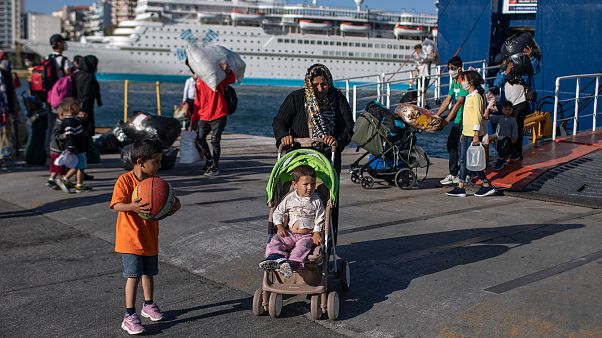UN: 1% of all humanity on the move as refugee numbers rise
AP • last updated: 18/06/2020 -

Refugees and migrants wearing masks arrive at the port of Piraeus, near Athens. 11 June 2020. - Copyright Petros Giannakouris/AP Photo
The UN refugee agency says the number of asylum-seekers, internally displaced people and refugees worldwide shot up by nearly nine million people last year - the biggest rise in its records.
In its annual "Global Trends" report released on Thursday, the Office of the United Nations High Commissioner for Refugees says that the 79.5 million people account for 1% of all humanity amid conflict, repression and upheaval.
UNHCR chief Filippo Grandi points out that of the 79.5 million people forcibly displaced, 68% come from only five countries: Myanmar, Afghanistan, Syria, South Sudan and Venezuela.
EU pledges aid to Venezuelan refugees impacted by coronavirus pandemic
Homeless under lockdown: the forgotten faces of France's coronavirus nightmare
Coronavirus: Asylum seekers return Portuguese kindness during COVID-19 lockdown
"Which proves the point that if crisis and conflicts were resolved in these countries, most or a big part of the forced displacement problem would be, would be finished, would be resolved", Grandi told The Associated Press on Wednesday.
The surge was chalked up in part to a new way of counting people displaced from Venezuela and "worrying" new displacement in the persistent trouble spots of the Democratic Republic of Congo, the Sahel region of Africa, Yemen and Syria.
Syria
War-torn Syria alone accounted for more than 13 million of those people on the move.
While the total figure of people facing forced displacement rose from 70.8 million at the end of 2018, some 11 million people were "newly displaced" last year, with poorer countries among those most affected.
Grandi said that the global pandemic had had a major impact on refugees and the displaced, as 164 countries either partially or totally closed their borders to fight the new coronavirus.
He explained that many relied on the "informal economy" often involving day work - activities at risk as governments ratchet up lockdowns.
He especially expressed concern about the impact of the new coronavirus in Latin America, where millions of Venezuelans have fled upheaval at home and could face hardship abroad among lockdowns and other restrictive measures to fight the pandemic.
No comments:
Post a Comment